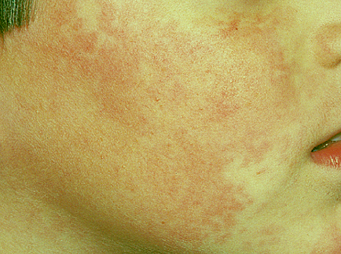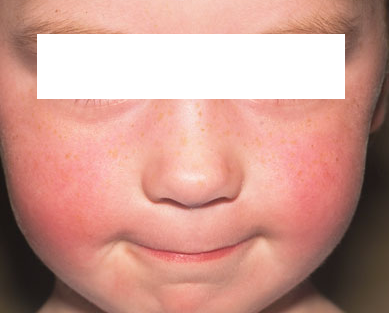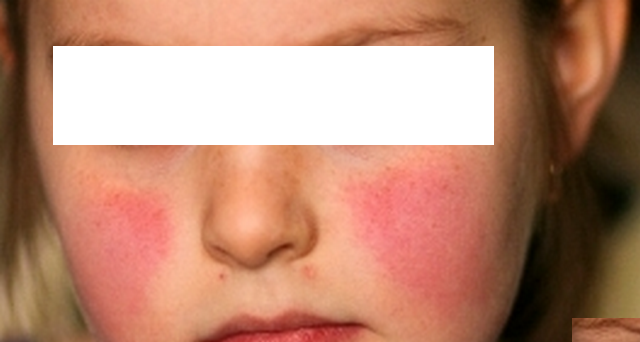Slapped cheek syndrome is a very contagious and common childhood illness that is caused due to infection with parvovirus. The condition gets its name from its symptomatic and unique facial rash.
It is also referred to as the fifth disease, because as per history, it is one of the five common childhood ailments that feature a rash.
Most instances of slapped cheek syndrome are mild and do not need extensive treatment. However, the condition can be very serious in some adults. In some cases, parvovirus infection in expectant mothers can result in health complications for the unborn baby. Individuals with impaired immune systems, and/or with some forms of anemia are also vulnerable to developing severe cases of slapped cheek syndrome.
Slapped cheek syndrome symptoms
Slapped cheek syndrome generally does not result in any signs and symptoms in most cases. However, when signs do appear, then they tend to differ widely as per the age of the affected individual.
Symptoms of slapped cheek syndrome in children
- Initial signs of the disorder include the following:
- Weak or mild fever
- Increased soreness of the throat
- Stomach upset
- Fatigue or weariness
- Headache
- Itching
- Unique facial rash:
- A few days after the occurrence of the initial symptoms, a bright red and distinctive rash may be visible on the face. The rash may affect both the cheeks.
- The rash may eventually spread to the trunk, arms, buttocks and thighs. This extended rash may have a pink, somewhat raised, and lacy look.
- The rash normally tends to appear near the end of the disease. It is possible that the rash may be misdiagnosed as a side effect to drugs or some other viral rash.
- The rash may go and come for up to 3 weeks. It may become more prominent when the child affected by slapped cheek syndrome spends long time under the sun or is exposed to very high temperatures.
Symptoms of slapped cheek syndrome in adults
- Adults affected by slapped cheek syndrome generally do not elicit the distinctive facial rash.
- The most prevalent symptom in adults is the presence of joint tenderness and soreness that can last for several days or weeks. The joints of the knees, wrists, ankles and hands are usually the most commonly affected.
Causes of slapped cheek syndrome
- Slapped cheek syndrome is caused due to infection by the human parvovirus B19. It is not the same as the parvovirus that is visible in cats and dogs. Hence, one cannot get the condition from their pets or vice versa.
- Slapped cheek syndrome is more prevalent in elementary school-age children at the time of outbreaks during spring and winter months. However, the condition can affect anyone and at any time of the year. Just like cold, the illness is contagious and spreads from one person to another via hand-to-hand contact and respiratory discharges.
- The condition is contagious only till the time the rash appears. Once the distinctive rash is visible, then the affected individual stops being deemed as contagious and does not need to remain in isolation
- Nearly fifty percent of the adults are immune to infection by parvovirus, generally due to previous, undetected cases of childhood infection.
Anemia and slapped cheek syndrome
Infection by parvovirus can result in extreme complications in individuals with anemia. Anemia is a disorder wherein the red blood cells which supply blood to the different tissues of the body, are used up faster than the rate of replacement by the bone marrow.
- The production of red blood cells in anemic patients may stop when they get affected by slapped cheek syndrome, which can further precipitate the anemia. Individuals with sickle cell anemia are at greater risk to such complications as compared to patients with other forms of anemia
- Infection by parvovirus in pregnant women can on occasions affect the red blood cells of the unborn child, leading to extreme anemia, which in turn can cause stillbirth or miscarriage. Complications of slapped cheek syndrome are the greatest during the first half of pregnancy
- Individuals with cancer, AIDS or those consuming immunosuppressant drugs tend to have weakened or impaired immune systems. Infection with parvovirus in such people can also result in the development of severe anemia
Slapped cheek syndrome treatment
- Individuals with mild cases of slapped cheek syndrome may only require self-care at home.
- Most of the self care methods focus on alleviating the symptoms of the condition and to reduce discomfort if any.
- The affected children need to intake plenty of fluids, and also get lots of rest. Minor pains, aches and temperatures can be reduced with the use of medications.
- Children should not be given aspirin as it increases the risk to developing the life-threatening Reye’s syndrome. If need be, a parent may consult a doctor before giving aspirin to the affected child.
- Severely anemic patients with the disorder may require blood transfusion at a hospital. Similarly, patients with compromised immune system may be able to fight the parvovirus infection via antibodies received through immune globulin injections.
Slapped cheek syndrome rash pictures


